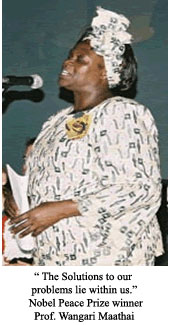 ReConnect Africa is a unique website and online magazine for the African professional in the Diaspora. Packed with
essential information about careers, business and jobs, ReConnect Africa keeps you connected to the best of Africa.
ReConnect Africa is a unique website and online magazine for the African professional in the Diaspora. Packed with
essential information about careers, business and jobs, ReConnect Africa keeps you connected to the best of Africa.


Nobel Peace Prize Winner Prof. Wangari Maathai addresses Africa Diaspora and Development Day 2005
Africa Diaspora and Development Day (AD3) is the annual one-day event held by UK-based African Foundation for Development (AFFORD). Enterprise was the focus for the 2005 event; how Africans can use the skills, experience and knowledge acquired outside the continent to boost employment-creating economic growth in Africa. Featuring a range of master classes and workshops on subjects including enterprise development, employment and careers in Africa, the purpose of this year’s ADDD was to explore the mindsets, structures and mechanisms needed in order for Africans outside Africa to support SME growth in Africa.
 Arriving to a standing ovation, the keynote speaker for the event, Professor Wangari Maathai, Assistant Minister for Environment and Natural Resources in Kenya and 2004 Nobel Peace Prize winner, expressed her delight at the commitment of Africans in the Diaspora to the economic and social development of Africa. While acknowledging the efforts of the musicians campaigning in London’s Hyde Park, she urged the Africans present to remain focused on what they are already doing.
Arriving to a standing ovation, the keynote speaker for the event, Professor Wangari Maathai, Assistant Minister for Environment and Natural Resources in Kenya and 2004 Nobel Peace Prize winner, expressed her delight at the commitment of Africans in the Diaspora to the economic and social development of Africa. While acknowledging the efforts of the musicians campaigning in London’s Hyde Park, she urged the Africans present to remain focused on what they are already doing.
Peace and Democracy
Professor Maathai paid tribute to the Nobel Prize awarders for recognising that the environment, democracy and peace are inextricably linked. Using the analogy of a 3 legged African stool, she noted that the extent to which any country is willing to invest in all 3 legs – managing resources in a sustainable way, sharing resources more equitably and creating a democratic space that respects the rule of law and human rights – will determine the extent of its ability to develop.
In a keynote speech punctuated by extended applause, the Kenyan Minister spoke of Africa as a continent rich in natural and human resources but impoverished by the exclusion of the majority to the natural resources of the land. Another major cause of poverty, she said, was the inability of African countries to add value to their natural resources and cited the need for skills, information, knowledge and tools as critical to the development of value added processes and services.
Touching on the subject of the billions of dollars sent to Africa by the Diaspora each year in the form of remittances, the Nobel Laureate warned that without skills, remittances will not enable people to make productive use of the money sent. Turning to the theme of the day, she noted that 90% of businesses in Africa are small enterprises and urged the conference to identify ways in which skills could be identified to aid such businesses as, with limited opportunities for employment; an enterprise culture is needed as a means of creating wealth in Africa.
“Where are your 10 trees?”
Referring to the environment, Professor Maathai urged a change of attitude to the ecosystem. “The Congo Basin forest ecosystem”, she said, “is the second largest in the world and is of critical importance to African and global climate patterns.” She challenged the audience to make sure that each person plants ten trees to replace the carbon dioxide they will use in their lifetime.
“Plant trees”, she said. “Ask people to plant trees for you in your village, in your country. Do you know where your ten trees are?”
Fielding questions from the audience after her speech, Professor Maathai insisted that Africans are now in a position to push their leaders, especially since African leaders are now more willing than ever to be pushed. “Democracy will happen when people demand better governance of their leaders and for that they need education and information,” she said. Thanking the organisers of AD3, she closed by urging action and the need to work together, adding; “We met here today and because of this, we have made a difference.”
